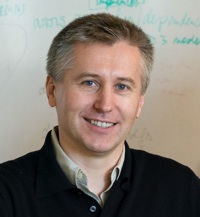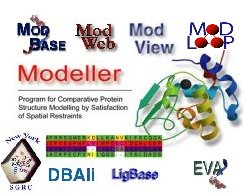
BIOSKETCH:
Andrej Sali received his BSc degree in chemistry from the University of Ljubljana, Slovenia, in 1987, working on the sequence-structure-function relationship of stefins and cistatins under the supervision of Professor Vito Turk; and his PhD from Birkbeck College, University of London, UK, in 1991, developing the MODELLER program for comparative modeling of protein structures under the supervision of Professor Tom L. Blundell. He was then a postdoc with Professor Martin Karplus at Harvard University as a Jane Coffin Childs Memorial Fund fellow, studying lattice Monte Carlo models of protein folding. From 1995 to 2002, he was first an Assistant Professor and then an Associate Professor at The Rockefeller University. In 2003, he moved to University of California, San Francisco, as a Professor of Computational Biology in the Department of Bioengineering and Therapeutic Sciences, Department of Pharmaceutical Chemistry, and California Institute for Quantitative Biosciences (QB3). He was recognized as Sinsheimer Scholar (1996), an Alfred P. Sloan Research Fellow (1998), an Irma T. Hirschl Trust Career Scientist (2000), the Zois Award of Science Ambassador of Republic of Slovenia (2007), a Fellow of International Society for Computational Biology (2014), Jubilee Professor of Indian Academy of Sciences (2017), Bijvoet Medal recipient (2018), and member of National Academy of Sciences of USA (2018). He was an Editor of Structure from 2002 to 2021. He is also a Founder of Prospect Genomix that merged with Structural Genomix (2001) and was acquired by Eli Lilly Inc. in 2008; and of Global Blood Therapeutics (2012) that was acquired by Pfizer Inc. in 2022. Dr. Sali develops, applies, and disseminates computational methods for determining and modulating structures and functions of proteins and their assemblies.
RESEARCH INTERESTS:
Andrej Sali’s laboratory develops, applies, and disseminates modeling methods for computing structures of biomolecular assemblies that are consistent with all available information from experimental methods, physical theories, statistical inference, and prior models. This integrative approach maximizes accuracy, precision, and completeness of the resulting models. The current version of the corresponding program, Integrative Modeling Platform (IMP), is being used to determine the structures of a number of macromolecular assemblies, in collaboration with experimentalists. Most prominently, the approach already enabled the determination of the configuration of the 550 proteins in the yeast Nuclear Pore Complex and 19 proteins in the 19S subunit of the 26S proteasome. This research was also a major contributing factor to the establishment of PDB-Development, the nascent worldwide Protein Data Bank archive for integrative structures. Finally, the integrative modeling approach is being expanded to the mapping of biomolecular networks and spatiotemporal modeling of entire cellular neighbourhoods.
Server Room
|
Closeup
|
Projects Gallery
|
all photographs: © majedphoto.com



